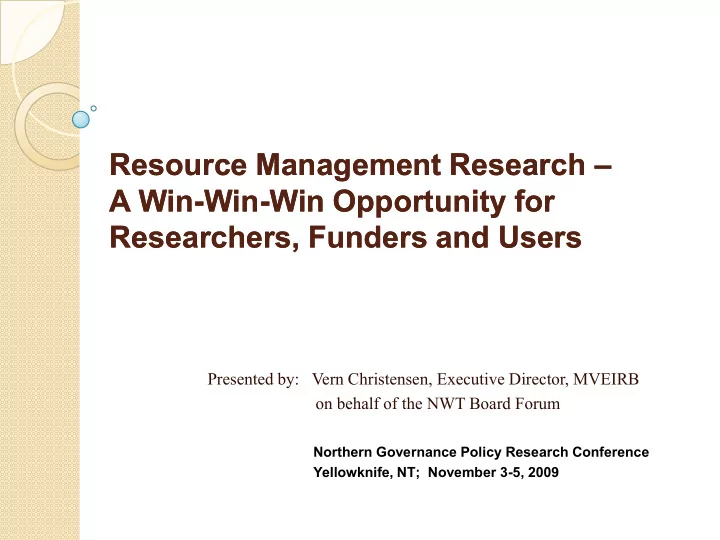

Resource Management Research Resource Management Research – A Win A Win- -Win Win-Win Opportunity for Win Opportunity for Researchers, Funders and Users Researchers, Funders and Users Presented by: Vern Christensen, Executive Director, MVEIRB on behalf of the NWT Board Forum Northern Governance Policy Research Conference Yellowknife, NT; November 3-5, 2009
The NWT Board Forum The NWT Board Forum Comprised of Resource Co-management Boards in the NWT set up under the MVRMA and the Inuvialuit Final Agreement Also includes the NEB, GNWT and INAC Purpose is to address common issues provide a common forum to hear stakeholder concerns share information share resources
Who is the NWT Board Forum? Who is the NWT Board Forum?
The Issue The Issue Northern resource management boards have identified important knowledge gaps Most boards do not have the mandate or resources to fill those information gaps The eyes of Canadians are on the north - there is a lot of money available for northern research Researchers want to work in northern Canada, and their work to have value “on the ground”
How do we fill the gaps? How do we fill the gaps? Researchers Research & Practitioners Monitoring EIA Org’ns , Government Dep’ts , Regulators, Land Claimant Org’ns , Developers Academia, Industry, Users Primary Investors Gov’ts , Industry, Foundations Funders
“Communication, Communication “Communication, Communication Communication Communication ” ” – A Win A Win-Win Win-Win Opportunity Win Opportunity For Funders For Funders – Researchers Researchers – Users Users
Why kind of information are we Why kind of information are we looking for? looking for? Emerging issues Knowledge gaps common to many regions “State of the art” knowledge regarding valued components of the environment Best practices
Valued Environmental Components Valued Environmental Components (VECs) (VECs) Valued components of the physical and human environment including: ◦ Biophysical components ◦ Social components ◦ Economic components ◦ Cultural components E.g. Caribou, Mackenzie River, Traditional lifestyle
Mackenzie River Watershed Mackenzie River Watershed Major watersheds drain into the Mackenzie River from the Yukon, BC, Alberta and Saskatchewan. Impacts of upstream developments on the land, water, air, wildlife and people of the Mackenzie Valley residents is an emerging issue.
Environmental Management Environmental Management – Valued Components Valued Components
Boards do “process related” Boards do “process related” research for Guidelines research for Guidelines Environmental Impact Assessment Incorporating Traditional Knowledge into EIA Conducting socio-economic impact assessment Conducting cultural impact assessment (currently underway)
The NWT Board Forum’s The NWT Board Forum’s Research Priorities Initiative Research Priorities Initiative A living document called “Consolidated Research Priorities: a Publication of the NWT Board Forum” Find it at nwtboardforum.com or other NWT Board Forum member websites
CONSOLIDATED CONSOLIDATED RESEARCH RESEARCH PRIORITIES LIST PRIORITIES LIST • Contains 13 high priority research areas • 20 other research areas • T wo topic areas: - Biophysical Impacts - Social, Economic and Cultural Impacts
Caribou Caribou Caribou decline and the effects of development Caribou harvesting statistics Impacts of seismic lines and other linear developments Cumulative development impacts, especially habitat loss
Water & Aquatic Species Water & Aquatic Species The ecology of large lakes Ecosystem interactions among aquatic resources Migration and over wintering patterns of keystone fish species Cumulative effects of development on the aquatic resources of the Mackenzie River watershed
Socio Socio-Economic & Cultural Economic & Cultural Methods to forecast labour demand and impacts of development on aboriginal cultures and lifestyles Long distance commuting effects Aboriginal cultural landscapes Measurable indicators for the assessment of cumulative impacts and thresholds for valued components
Better Information means Better Information means Better Decisions Better Decisions • Priority VECs • Status Quo • Wildlife Mgmt • Appropriate indicators • Some CE Plans • Standardized methods information • Land Use Plans • Relevant & accessible about many VECs • Social/Economic/ baseline information Cultural Dev. Plans • VEC Thresholds Increasing Quality of Quality EIA & Resource Mgmt Regulatory Decisions Information
Our Communication Strategy Our Communication Strategy We need to communicate our research priorities in a timely and effective way to funders and researchers
Why are we doing this? Why are we doing this? T o obtain better information for making effective resource management decisions T o benefit northerners and all Canadians
Target Audiences Target Audiences University research networks Government research networks Northern Geoscience Forum Science in a Changing North conference Canadian IPY Secretariat Polar Access listserve MVEIRB’s EIA Practitioner’s Workshops Canadian Circumpolar Institute Arctic Institute of North America Others
Other Audiences Other Audiences General public Aboriginal groups Industry stakeholders
How are we communicating? How are we communicating? Board Forum web portal and member websites (www.nwtboardforum.com) Key academic contacts and listserves Conference presentations Paper copies for public display Newsletters Annual reports Periodic media releases
Key Messages Key Messages Important information gaps that need to be filled Resource management boards want the best possible information to make good decisions If research has been done direct us to it The “Consolidated Research Priorities” listing is living document and will be updated bi-annually
Keeping Priorities Current Keeping Priorities Current T o be updated in spring of 2010 Then review and updating bi- annually For current information: Contact : Alan Ehrlich, Senior EAO, MVEIRB Phone 867-766-7056 aehrlich@reviewboard.ca
Thank you Thank you – from the NWT Board Forum from the NWT Board Forum
Recommend
More recommend